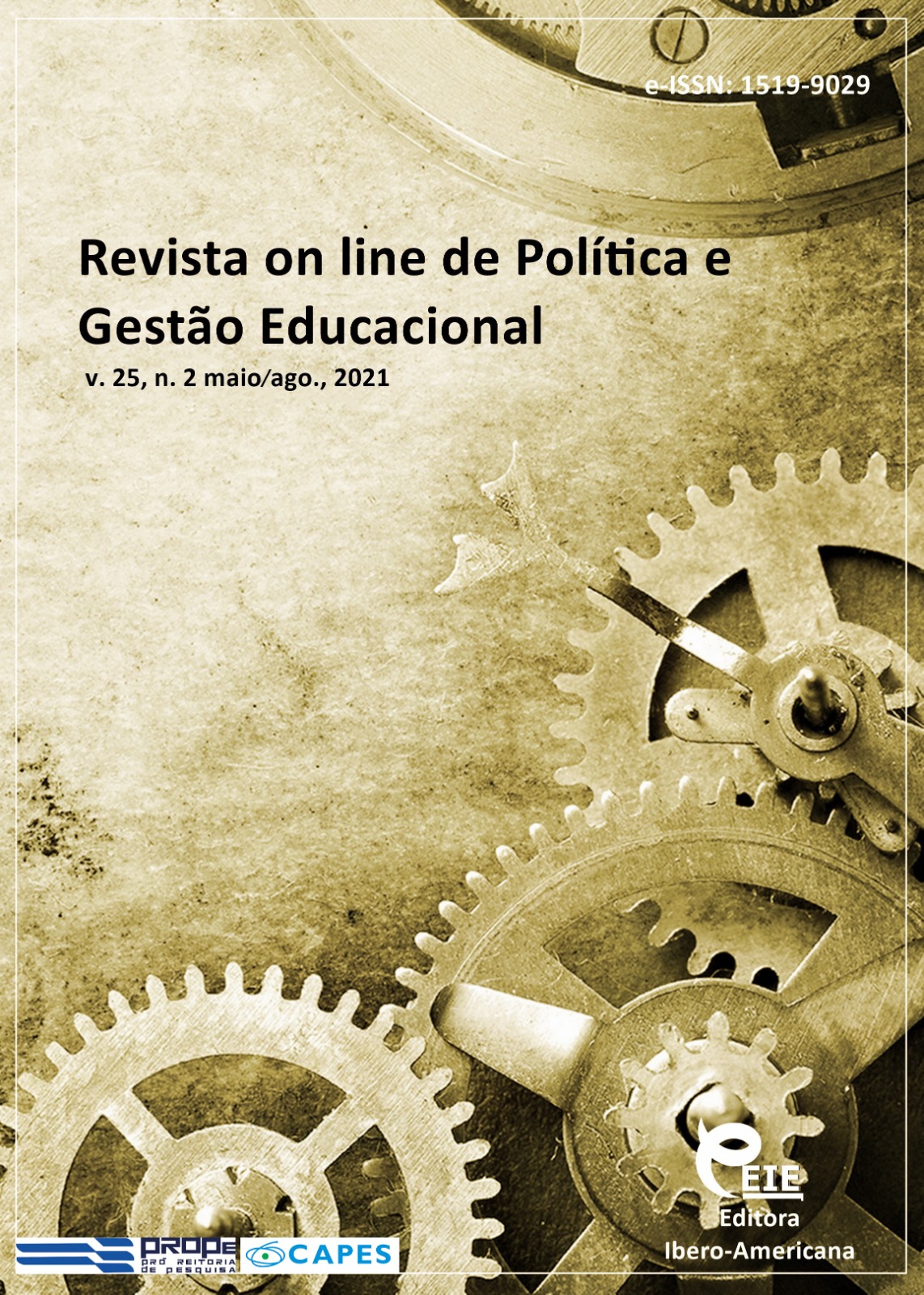El papel y el lugar de la etnopedagogía en el ecosistema educativo
DOI:
https://doi.org/10.22633/rpge.v25i2.15317Palabras clave:
La educación, Ecosistema educativo, Pueblos del ártico y del norte, Digitalización, EtnopedagogíaResumen
Este artículo aborda diversos sistemas educativos que han llevado a la transición al ecosistema educativo. La aplicación de las bases etnopedagógicas en el proceso educativo moderno e innovador amplía las fronteras del conocimiento en la forma de comprensión del medio ambiente, proporciona la formación de la conciencia ecológica y forma estructuras de visión del mundo, proporcionando a priori la coevolución de la persona y la sociedad, el individuo y la naturaleza, la persona y el mundo. El proceso de transición del entorno educativo al ecosistema educativo, se centra en el aprendizaje a lo largo de la vida y el desarrollo profesional continuo, adaptando a la persona a los nuevos retos de nuestro tiempo. La relevancia de la transición se debe al desarrollo progresivo de la comunidad humana, que moderniza incansablemente la esencia y el lugar del sistema educativo en el entorno sociocultural. No hay que olvidar los métodos, mecanismos y formas de educación y formación tradicionales de la pedagogía popular.
Descargas
Citas
BARAKHSANOVA, E. A. et al. Current trends in digital education development in the Republic of Sakha (Yakutia). Espacos, v. 40, n. 22, p. 18, 2019.
BARAKHSANOVA, E. A. et al. Peculiarities of quality management of teachers' e-learning training in the Arctic regions. Spaces, v. 38, n. 55, 2017.
BARAKHSANOVA, E. A. et al. Transdisciplinary approach to training future managers for digital education in Yakutia. Propósitos y Representaciones, v. 8, n. esp. 3, e702, 2020.
BRODO, J. A. Today’s ecosystem of e-learning. Trainer Talk, v. 3, n. 4, 2006. Available: http://enewsbuilder.net/salesmarketing/e_article000615779.cfm. Access: 10 Dec. 2020.
LEURENT, H.; BOER, E. D. Fourth industrial revolution beacons of technology and innovation in manufacturing. The world economic forum. Geneva, Switzerland, 2019.
MARKOVICH, D. J. Social ecology: a book for the teacher. Moscow: Prosveshcheniye, 1991. 173 p.
NAZARCHUK, A. V. Ethics of a globalizing society. Moscow: Direct Media Publishing, 2002. 381 p.
NEUSTROEV, N. D. Pedagogical aspect of globalization and ethnic mentality. Philosophy of Education, n. 2, n. 41, p. 30-36, 2012.
NEUSTROEV, N. D.; NEUSTROEVA, A. N.; SHERGINA, T. A. Individualization and ethnopedagogy at small elementary schools components of vocational training for university tutors. Sibirica: Interdisciplinary Journal of Siberian Studies, v. 17, n. 3, p. 92-115, 2018.
OLEYNIKOV, B. V.; PODLESNYI, S. A. On the concept of "ecosystem of learning" and directions for the development of computerization of education. Knowledge, Understanding, Skill, n. 4, p. 84-91, 2013.
OZHEGOV, S. I.; SHVEDOVA, N.Y. Dictionary of the Russian language. Moscow: ITI Technologies LLC, 2003. 944 p.
RAVEN, J. Competence in modern society. Identification, development and release. Moscow: Kogito Center Publ., 2002. 400 p.
RUSSIA. Philosophical encyclopedic dictionary. Moscow: Soviet Encyclopedia, 1983. 840 p.
SHAPOVALENKO, I. V. Developmental psychology (Evolutionary psychology and developmental psychology). Moscow: Gardariki, 2005. 349 p.
SHCHEDROVITSKY, G. P. System of pedagogical studies (methodological analysis). In: Pedagogics and logic. Moscow: Castal Publishing House, 1993. p. 16200.
TRETYAKOVA, T. V. Concept of pedagogical education development in North-Eastern Federal University. Yakutsk: Printing House of Company Dani-Almas LLC, 2019. 36 p.
UDEN, L.; WANGSA, I. T.; DAMIANI, E. The Future of e-learning: e-learning ecosystem. In: INAUGURAL IEEE INTERNATIONAL CONFERENCE ON DIGITAL ECOSYSTEMS AND TECHNOLOGIES, 2007, Cairns. Proceedings […]. Cairn, Australia: IEEE, 2007. p. 113-117.
VOLKOV, G. N. Ethnopedagogy: textbook for students of secondary and higher pedagogical educational institutions. Moscow, 1999. 168 p.
VYGOTSKY, L. S. Collected works in 6 volumes. In: ELKONIN, D. B. (Ed.). Child psychology. Moscow: Pedagogy, 1984. v. 4, 432 p.
YASVIN, V. A. Educational environment: from modeling to designing. Moscow: Sense, 2001. 365 p.
ZHIRKOVA, Z. S. Management of educational systems: textbook for students of higher educational institutions. St. Petersburg: Science-Intensive Technologies, 2020. 122 p.
ZHIRKOVA, Z. S. The management model of innovation activity in rural schools of the Polar Region. Education and Science. Proceedings of the Ural Branch of the Russian Academy of Education, v. 5, n. 73, p. 92-108, 2010.
Publicado
Cómo citar
Número
Sección
Licencia
Derechos de autor 2021 Revista on line de Política e Gestão Educacional

Esta obra está bajo una licencia internacional Creative Commons Atribución-NoComercial-CompartirIgual 4.0.
Manuscritos aceitos e publicados são de propriedade da Revista on line de Política e Gestão Educacional. É vedada a submissão integral ou parcial do manuscrito a qualquer outro periódico. A responsabilidade do conteúdo dos artigos é exclusiva dos autores. É vedada a tradução para outro idioma sem a autorização escrita do Editor ouvida a Comissão Editorial Científica.











